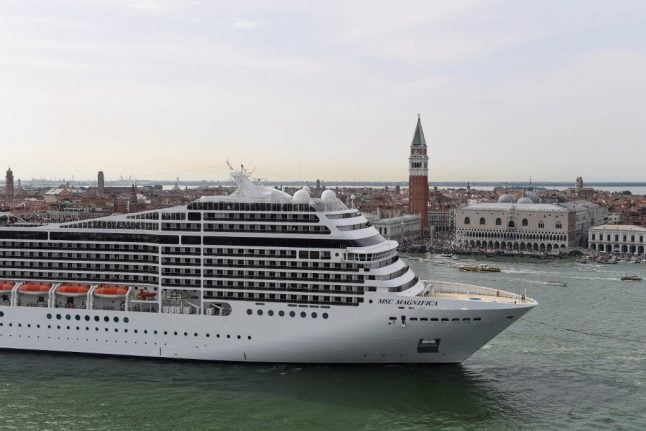Instead the companies are planning departures from the port of Trieste, around two hours north-east of Venice, and Genoa on the north-west coast.
Italy's government has given the go-ahead for cruises to restart from August 15th, though operators must stick to European routes in line with a ban on tourism from outside the EU.
READ ALSO: Face masks remain and cruise ships return: What's in Italy's new emergency decree?
And while Venice is typically a highlight of Italian cruises, receiving more than a million passengers a year, as sailing resumes it doesn't look set be the starting point, destination or even a stopover for ships operated by Italy's two biggest cruise companies.
The news has been hailed as a victory by anti-cruise campaigners in Venice, but it's not yet clear why operators are steering clear, or how long they'll stay away.

Photo: Miguel Medina/AFP
The MSC Grandiosa will be the first liner to sail after ports reopen, leaving from Genoa for Malta with stops in Rome, Naples and Palermo. It's one of two Mediterranean routes the company has confirmed, the other departing from Trieste towards Greece and returning to Bari – without stopping in Venice.
Meanwhile Costa Crociere says its cruises will resume in September, starting with a weekly cruise from Trieste to Greece and followed by another route from Genoa to Malta.
The company did not directly answer The Local's questions about whether it would return to Venice, but in an emailed statement it said that it would announced further details of its itineraries in the coming days. All other routes are suspended until September 30th, 2020, it said.
MSC had not responded to a request for comment at the time of writing. Earlier this month the company said that passengers departing from Trieste would be offered the chance to visit Venice by train.
READ ALSO:
- 'Venetians want you to know and experience their city': A crowd-free weekend in Venice
- 'Without tourists, Venice is a dead city': Not all Venetians are glad the crowds have gone
- OPINION: After flooding and coronavirus, is it time Venice stopped relying on tourism?
Anti-cruise ship activists had threatened to prevent liners returning to Venice by any means possible, including blocking the port with boats or even acts of sabotage.
“We said it, we promised it and so it will be: no ships will enter the lagoon for the entire season,” declared campaign group Comitato NoGrandiNavi on Monday. “No company has the strength to defy our blockade against the return of these ships that are useless, harmful and unsustainable in every respect!”
The group was organizing a rally at the port on Friday to celebrate what it called “the expulsion of big ships from Venice”, which it said it wanted to see gone from the lagoon for good.

A protester calls for cruise ships to be banned from Venice. Photo: Andrea Pattaro/AFP
Residents have long complained that giant cruise ships cause environmental damage and flood Venice with day-trippers, who are less valuable to the local economy than visitors paying to stay overnight.
Before the pandemic the city council planned to start charging day-trippers an entry fee in summer 2020, which would have ranged from €3 to €10 at peak times.
But port workers protested this week calling for liners to return. They blamed the operators' decision to skip Venice both on anti-cruise activists but also the local government, which they said had failed to provide companies with clear options to return.
In a statement, the workers said they supported calls to reroute cruises away from St Mark's Square in the historic centre, but that banning cruises from Venice altogether would put 4,000 jobs at risk.
In response, Comitato NoGrandiNavi called for “a new development model for the city and for jobs” to replace mass tourism while protecting residents and workers.



 Please whitelist us to continue reading.
Please whitelist us to continue reading.
Member comments